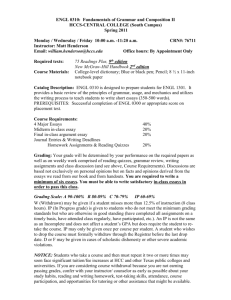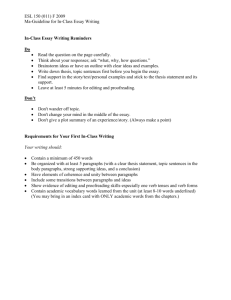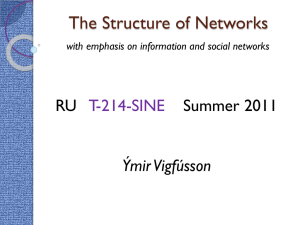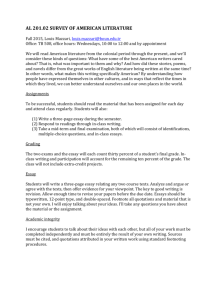Semester and Year - Spring 2014 CRN (Course Reference Number
advertisement
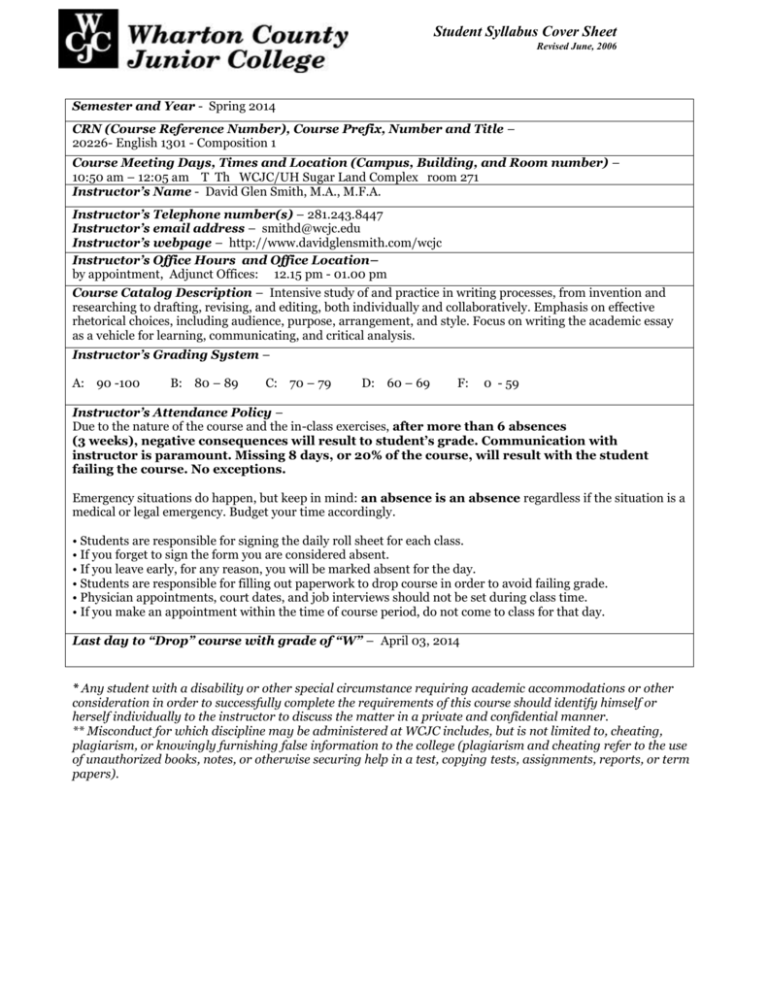
Student Syllabus Cover Sheet Revised June, 2006 Semester and Year - Spring 2014 CRN (Course Reference Number), Course Prefix, Number and Title – 20226- English 1301 - Composition 1 Course Meeting Days, Times and Location (Campus, Building, and Room number) – 10:50 am – 12:05 am T Th WCJC/UH Sugar Land Complex room 271 Instructor’s Name - David Glen Smith, M.A., M.F.A. Instructor’s Telephone number(s) – 281.243.8447 Instructor’s email address – smithd@wcjc.edu Instructor’s webpage – http://www.davidglensmith.com/wcjc Instructor’s Office Hours and Office Location– by appointment, Adjunct Offices: 12.15 pm - 01.00 pm Course Catalog Description – Intensive study of and practice in writing processes, from invention and researching to drafting, revising, and editing, both individually and collaboratively. Emphasis on effective rhetorical choices, including audience, purpose, arrangement, and style. Focus on writing the academic essay as a vehicle for learning, communicating, and critical analysis. Instructor’s Grading System – A: 90 -100 B: 80 – 89 C: 70 – 79 D: 60 – 69 F: 0 - 59 Instructor’s Attendance Policy – Due to the nature of the course and the in-class exercises, after more than 6 absences (3 weeks), negative consequences will result to student’s grade. Communication with instructor is paramount. Missing 8 days, or 20% of the course, will result with the student failing the course. No exceptions. Emergency situations do happen, but keep in mind: an absence is an absence regardless if the situation is a medical or legal emergency. Budget your time accordingly. • Students are responsible for signing the daily roll sheet for each class. • If you forget to sign the form you are considered absent. • If you leave early, for any reason, you will be marked absent for the day. • Students are responsible for filling out paperwork to drop course in order to avoid failing grade. • Physician appointments, court dates, and job interviews should not be set during class time. • If you make an appointment within the time of course period, do not come to class for that day. Last day to “Drop” course with grade of “W” – April 03, 2014 * Any student with a disability or other special circumstance requiring academic accommodations or other consideration in order to successfully complete the requirements of this course should identify himself or herself individually to the instructor to discuss the matter in a private and confidential manner. ** Misconduct for which discipline may be administered at WCJC includes, but is not limited to, cheating, plagiarism, or knowingly furnishing false information to the college (plagiarism and cheating refer to the use of unauthorized books, notes, or otherwise securing help in a test, copying tests, assignments, reports, or term papers). (Syllabus subject to change with advance notice.) RECOMMENDED BROWSERS: You should use Google Chrome or Firefox to access MyCompLab. We also have been told that Mozilla Firefox is better for Blackboard. Google Chrome: https://www.google.com/intl/en/chrome/browser/?&brand=CHMA&utm_campaign=en&utm_source=en-hana-us-bk&utm_medium=ha Mozilla Firefox: www.mozilla.com TEXTBOOKS: Hacker, Diana. Rules for Writers. (spiral bound) Flachmann, Kim, and Michael Flachmann. Nexus: A Rhetorical Reader for Writers. A three-ring binder book with a code for My Comp Lab if you buy at the bookstore. Costs $50 if you buy an online code and e-text at the Pearson site. Recommended: College dictionary, flash drive, on-line storage account (Dropbox.com < free) ASSIGNMENTS AND GRADE PERCENTAGES: ASSIGNMENTS AND GRADE PERCENTAGES: In Class Exercises/ Quizzes Group Work / Oral Presentation Essay Assignments (three: includes collaborative -group paper) Final Research Paper: • Thesis Statement/Introduction Paragraph • Preliminary Work Cited page • Full Document Departmental Grammar Final 25% 25% 20% 25% 05% Students must keep copies of all returned work after grading in the unlikely event of data loss. • There will be in-class assignments, quizzes, and intensified reading homework. Completion of in-class assignments earns you points. Since these are based on specific lectures or readings, you must be present on the day the in-class assignment is given and collected. No late work will be accepted for this category. STUDENT LEARNING OUTCOMES: 1. Demonstrate knowledge of individual and collaborative writing processes. 2. Develop ideas with appropriate support and attribution. 3. Write in a style appropriate to audience and purpose. 4. Read, reflect, and respond critically to a variety of texts. 5. Use Edited American English in academic essays. TOPICAL OUTLINE: 1. The writing process. 2. Basic essay organization 3. Rhetorical modes a. Narration b. Description c. Exemplification d. Process e. Cause and Effect f. Comparison and Contract g. Classification and Division h. Definition 4. Sentence structure 5. Analysis of writing ESSAY FORMAT: Essays should be typed and have a standard one-inch margin. All papers should be double-spaced. No title page is necessary. For all essays, on the first page, you should type your name, my name, English 1301, and the date in the left hand corner of the page. Return twice and center your title. Put your last name and the page number in the upper right hand corner of each page. E-MAIL POLICY • Neither homework nor formal papers are accepted as an e-mail attachment. • Do not send e-mails requesting grades. Request a face-to-face appointment to discuss grades. • Save all returned paperwork. Progressive grades will be shown to students throughout course. • All correspondence with instructor regarding school matters must be through the official student e-mail account provided by WCJC.edu. GRADING STANDARDS: Essays will be graded based on a variety of skills. First, content and organization are most important. All written work should show evidence of significant thought and contain logically presented ideas. Second, sentences, word use and tone, and punctuation and mechanics are important. You should pay close attention to eliminating major sentence errors, such as comma splices, fragments, and fused sentences. Points will be deducted for errors on your essays. LATE ESSAYS: Since the progress of this class depends on essays turned in on time, late essays will be penalized ten points for each course day that they are late. If you miss class when an essay is due, your grade will show accordingly. • After two course days (one week), late papers will not be accepted. • Likewise quizzes and in-class exercises cannot be made up. CELL PHONE / TEXT MESSENGER/ LAPTOP POLICY Cell phones must be silent in class. If an important call arrives, take it into the hall quickly. On the other hand, no texting/IM/web surfing in the classroom. You will be asked to leave the room and will be given a mark of absence for the day. All desk surfaces should only show note-taking devices. Laptops are for note-taking only. If you hide your cell phone behind your school pack or your purse, you will be asked to leave and counted as absent. If you hide your cell phone in your lap or on your seat, you will be asked to leave and counted as absent. Only note-taking devices should be present on students’ desks. PLAGIARISM: If clear evidence of academic dishonesty is found for any assignment, 0 points for the assignment will be recorded, and the English Department Chair will be notified of the incident and the grade. If a second incident of academic dishonesty occurs, an F for the course grade will be recorded and the English Department Chair notified of the incident and the grade. REVISION POLICY: Only one assignment is structured for a revision process: the generation of an introduction of the thesis for final research paper. Otherwise, no other assignment follows a revision policy. SIX COURSE DROP LIMIT Under section 51.907 of the Texas Education Code, “an institution of higher education may not permit a student to drop more than six courses, including any course a transfer student has dropped at another institution of higher education.” A course that a student drops is counted toward the six-drop limit if: • The student was able to drop the course without receiving a grade or incurring an academic penalty; • The student’s transcript indicates or will indicate that the student was enrolled in the course • Once WCJC calculates that a student has a total of six affected drops from WCJC, he or she may not drop any additional courses at WCJC. The instructor will be required to award the grade of A, B, C, D, or F. • Exceptions: Severe illness, care of a sick or injured person, death of a family member, active duty service, change in work schedule that is beyond the control of the student, other good cause as determined by the institution. Keep in mind that it is the student’s responsibility to withdraw from the course. Faculty cannot withdraw students from the course. SERVICES FOR STUDENTS WITH DISABILITIES Wharton County Junior College is committed to providing a discrimination-free environment for its students with disabilities. Students with disabilities are encouraged to inform the college of any assistance they may need upon application. Early self-identification will allow the student to receive whatever accommodation he or she may need as quickly as possible. Students with disabilities are encouraged to register with the ADA Coordinator, located in the Office of Student Services and to provide appropriate documentation. This action entitles qualified students with disabilities to their legal rights and assures them of receiving information on services and procedures available to them. Disability information is strictly confidential and is not released without consent of the student. It is the responsibility of the student with a disability to voluntarily and confidentially disclose information regarding the nature and extent of the disability. Wharton County Junior College does not assume responsibility for providing special accommodations and services to students who have not identified themselves as having a qualifying disability and who have not made their need known. Contact Patsy Freeman, Disability Services Coordinator, at freemanp@wcjc.edu or (979) 532-6384. MAKE-UP EXAM POLICY: Depending on circumstances, missed examinations will be given within a week of scheduled test during a scheduled appointment at the testing center. Students are required to make appointments for missed tests at their convenience. However, according to school policies, no pre-determined dates may be changed for the Final Exam. COLLABORATIVE ESSAY REQUIREMENT FOR ENGL 1301: All students who take ENGL 1301 must write one collaborative essay per the Texas Coordinating Board’s statewide requirements for the course. Each English instructor will determine which essay assignment will serve as the collaborative assignment, but all English instructors will have a collaborative essay assignment within their ENGL 1301 courses. ORAL PRESENTATION REQUIREMENT FOR ENGL 1301: All students who take ENGL 1301 must complete one oral assessment as a college-wide requirement. Each English instructor will determine the scope of the oral assessment, but all English instructors will have an oral assessment within their ENGL 1301 courses. CLASSROOM DISCIPLINE: All students should show proper discipline, conducting themselves as in a typical, formal academic situation. Whenever the instructor is speaking to a fellow student, even if others in the room may suspect they know the answer to a supplied inquiry, everyone should listen closely to see if the instructor carries through with expectations. A portion of the basis of this class is to propose ideas and cultural concepts which may or may not follow the average thought process. Students should always be aware of differing opinions, if only as a manner of strengthening their own theories and approaches to their world and environments. Analysis and critical thinking are both strong venues for better understanding other perspectives; fiction often proposes scenes and situations which provoke further discussion. Such discussions promote further explanation of what it means to be human and why as individuals people often are violent towards others. In addition: • be curious • arrive early • respect others • ask questions • read ahead • study often • ask more questions MYCOMPLAB: English 1301 students are required to utilize the database MyCompLab. • A help line is available as a 24/7 chat site: http://247pearsoned.custhelp.com/. For any unresolved issues they will provide a receipt to substantiate your issue. • Here are the customer support number and hours: Students can call for assistance Monday through Friday, 12:00 P.M. to 8:00 P.M. EST / 17:00 to 01:00 GMT--General student line: 800-677-6337. Week Activities and Assignment 1 TUE-JAN 21 Basic Introduction • General Essay Guidelines • MLA papers • Pre-Writing Overview THR-JAN 23 Writing Modes Introduced • Prewriting Techniques: Journal, Zuihitsu, Listing, Mapping Quiz 1: Syllabus and Essay Guidelines 2 TUE-JAN 28 Tone • Audience • Formality: In-Class Exercise 1 THR-JAN 30 Narration Mode • In-Class Reading: Nexus pp. 93-94, 96-97 E. B. White “Once More to the Lake”—supplemental • In-Class Exercise 2 3 TUE-FEB 4 White “Once More to the Lake” • In-Class Exercise continued THR-FEB 6 Paragraph Construction • Assignment 1: Narration/Description Mode 4 TUE- FEB 11 Description Mode • In-class Reading: Nexus pp. 47-49, 51 Isabel Allende “The Amazon Queen” –supplemental • In-Class Exercise 3 THR-FEB 13 Allende “The Amazon Queen” • In-Class Exercise 3 continued Assignment 1: Narration/Description Mode due 5 TUE-FEB 18 Comparison/Contrast Mode • Nexus pp. 283-286 Deborah Tannen “Sex, Lies, and Conversation” p. 309 • In-Class Exercise 4 Assignment 2: Comparison/Contrast Mode THR-FEB 20 Comparison/Contrast Mode Deborah Tannen “Sex, Lies, and Conversation” • In-Class Exercise 4 continued 6 TUE-FEB 25 Comparison/Contrast Mode • John Berger, “Francis Bacon and Walt Disney” –supplemental THR-FEB 27 Grammar Pretest (room tba) Assignment 2: Comparison/Contrast Mode 7 TUE-MAR 4 Cause/Effect Mode • Nexus pp. 371-375 Joan Didion “On Keeping a Notebook”—supplemental • In-Class Exercise 5 THR-MAR 6 Cause/Effect Mode • Library Database Orientation Spring Break (Mar 10-16) 8 TUE-MAR 18 Cause/Effect Mode • Assignment 3: Collaborative Cause/Effect Paper Group Project Overview THR-MAR 20 Cause/Effect Mode • Group Project 9 TUE-MAR 25 Cause/Effect Mode • Group Project THR-MAR 27 Cause/Effect Mode • Group Project Week Activities and Assignment 10 TUE-APR 1 Group Presentations: G1, G2, G3 THR-APR 3 Group Presentations: G4, G5 Assignment 3: Collaborative Cause/Effect Paper Due 11 TUE-APR 8 Final Assignment Expectations Argumentative Papers Overview • Nexus, “Argument” pp. 411-414, “Opposing Views and Rebuttal” pp. 418-420 • In-Class Exercise 6 THR-APR 10 Group Test Introductions • Thesis Statements • Definition Mode Final Assignment Topic Selection 12 TUE-APR 15 Definition Mode Lauren Slater, “On Love”—supplemental • In-Class Exercise 7 Final Assignment Thesis/Introduction due: 200-300 words THR-APR 17 Easter Holiday (APR 16 – APR 21) 13 TUE-APR 22 Illustration Mode • Nexus pp. 138-141, 142 “Illustration Essentials: Reading” Brent Staples “Black Men and Public Space” p. 371 • In-Class Exercise 8 THR-APR 24 Sandra Cisneros “Only Daughter” p. 132 • In-Class Exercise 9 14 TUE-APR 29 Combining Modes • Virginia Woolf “The Death of the Moth” –supplemental In-Class Exercise 10 THR-MAY 1 Final Assignment due • Combining Modes 15 TUE-MAY 6 REVIEW TOP MISTAKES IN PRE-TEST THR-MAY 8 REVIEW TOP MISTAKES IN PRE-TEST FINAL EXAM MAY 12-15 May 13: Exit-Post Exam Time: 10:15 am - 12:15 am Statement on Academic Integrity: Wharton County Junior College requires that students submit their own work, whether they are writing papers, taking exams, or making oral presentations. Plagiarism, taking someone else’s words or ideas and representing them as your own, is expressly prohibited by college. Good academic work must be based on honesty. Submitting someone else’s work as one’s own is considered a serious offense by the college. Student academic dishonesty includes but is not limited to the following: • • • • copying the work of another during an examination or turning in a paper or an assignment written, in whole or in part, by someone else; copying from books, magazines, or other sources, including Internet or electronic databases like Academic Search Complete and Elibrary, or paraphrasing ideas from such sources without acknowledging them; submitting an essay for one course to a second course without having sought prior permission from your instructor; giving a speech and using information from books, magazines, or other sources or paraphrasing ideas from such sources without acknowledging them; NOTE on Team or Group Assignments: When you have an assignment that requires collaboration, it is expected that the work that results will be credited to the team unless individual parts have been assigned. However, the academic integrity policy applies to the team as well as to its members. All outside sources must be credited at outlined above. Instructors may require students to submit all written work electronically for submission to Safe Assignment and/or TurnIn.com, which are services that compare student papers with all Internet sources and a studentessay database to verify that the student has properly credited all sources downloaded and not copied or paraphrased from another writer’s work. CONSEQUENCES for Academic Dishonesty: Disciplinary action will be pursued in all instances in which it is determined that academic dishonesty has occurred. In the case of suspected wrongdoing, the faculty member may file charges with the Vice President of Student Services, inform his or her department head, and follow the process specified by the college. Disciplinary action may include but is not limited to the following: • Assignment of a failing grade for a test, examination, or assignment; • Assignment of a failing grade in the course; • Assignment of a student disciplinary sanction from the college; • Suspension or expulsion from the college. When a student plagiarizes, the student will not be eligible to revise the plagiarized paper, write a new paper to make up for the plagiarized paper, or receive any other special consideration. I acknowledge that I have read this Academic Integrity Policy and the consequences for violating it. Print Name _____________________________________ Date _________________________ Signature ____________________________________ Student ID Number ________________ *adapted from Robert Morris University's Academic Integrity Policy

